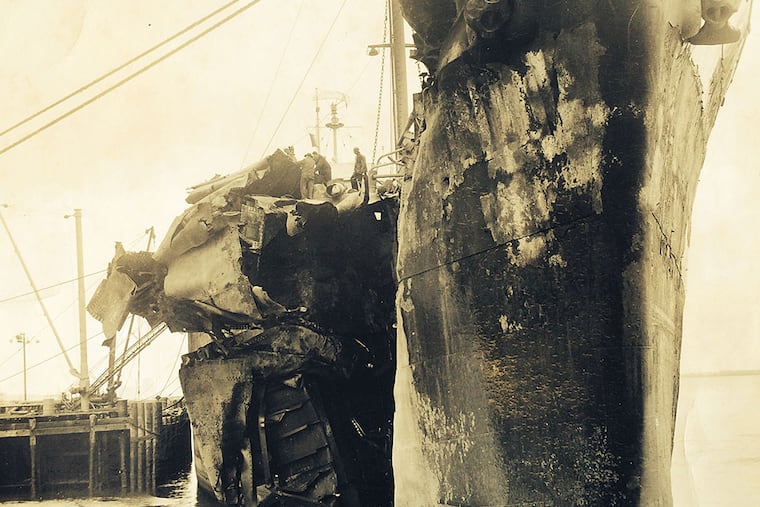Honors for Civil Air Patrol are long overdue
When a Sun Oil Co. tanker steamed out of Aruba on Feb. 20, 1942, the United States' recent entry into World War II had brought the battle to its own shores. The Atlantic and Caribbean coasts were roiling with predators - silent and sleek German submarines that were ravaging the country's merchant fleet.

When a Sun Oil Co. tanker steamed out of Aruba on Feb. 20, 1942, the United States' recent entry into World War II had brought the battle to its own shores. The Atlantic and Caribbean coasts were roiling with predators - silent and sleek German submarines that were ravaging the country's merchant fleet.
The tanker was named after Sun Oil's founder, Joseph Newton Pew, and like 16 other Sun Oil tankers, it had been requisitioned by the U.S. government for the war effort. Its crew of 36 men was responsible for transferring the J.N. Pew from New York to California via the Panama Canal.
Many were young men, including some teenagers who had lied about their age to join the merchant fleet. William Wenzel of Philadelphia wrote to his mother, "Subs can't hit us." Wenzel was accompanied on the voyage by Joseph McBride and Robert Kelly, his schoolmates from St. Carthage Parochial School in West Philadelphia.
The J.N. Pew would never make it to the Panama Canal. Four torpedoes from a German U-boat sank it off the Panama coast a day after it left Aruba.
Robert Kelly was one of three survivors, the 17-year-old mess boy enduring 21 days on a lifeboat, watching 10 others, including Wenzel, gradually die or jump overboard from madness. McBride had also perished. When Kelly was picked up by a passing Panamanian banana boat, he weighed 109 pounds; he had lost 70 in the ordeal. His harrowing tale was recounted by the Evening Bulletin in a hospital-bedside interview.
Over the next three years, Sun ships were torpedoed eight more times, and three more ships were lost. Sun would lose 141 seamen over the course of the war, many of them from the Philadelphia region.
But even before the J.N. Pew went down, help was on the way from a new organization of volunteer pilots, the Civil Air Patrol.
By early February 1942, the Germans had sunk 13 tankers belonging to American oil companies. This was not lost on William D. Mason, who oversaw Sun's Marcus Hook refinery for 16 years, and in wartime served as facilities security director of the Petroleum Administration for War.
"We were conscious of the fact that the tankers were sunk, and if they continued being sunk at that rate, that we wouldn't have petroleum enough to carry on the war effort," Mason would testify before Congress after the war.
He went to see Maj. Gen. John F. Curry, the Civil Air Patrol's first national commander, and promised him funding from the petroleum industry for coastal bases to launch sorties that would guard against submarine attacks. Mason secured from his boss, Sun Oil President J. Howard Pew, $10,000 to build the first bases in Atlantic City and Rehoboth Beach, Del.
For the first two months, the endeavor was completely funded by the petroleum industry, its rapid success allowing for the extension of bases from Maine to Mexico.
Four years after the war ended, on Oct. 8, 1949, more than 3,000 people gathered at the Marcus Hook refinery to dedicate the Sun Seamen's Memorial. J. Howard Pew thanked the Civil Air Patrol for keeping Sun's casualty list from running much longer than those 141 souls. "These Civil Air Patrol groups ... performed yeoman service in driving enemy submarines from our coastal waters," Pew said at the dedication.
To this day, that monument greets workers and visitors to the Marcus Hook Industrial Complex, now owned by one of Sun Oil's descendant companies, Sunoco Logistics Partners, and also where Sunoco Inc. produces racing fuel for NASCAR.
And recognition of those who patrolled the coasts in wartime will now extend beyond that monument. Today, the country will show its gratitude with the awarding of the Congressional Gold Medal - Congress's highest civilian honor - to the members of the Civil Air Patrol during a ceremony in Washington.
More than 200,000 men and women served in the Civil Air Patrol during World War II, and 65 volunteers lost their lives. The Civil Air Patrol is now the U.S Air Force Auxiliary, with core missions of aerospace education, cadet programs, and emergency services, such as search and rescue.
The belated honor of the Gold Medal could not be more deserved. As William Mason told the U.S. House of Representatives in 1948: "We, of the petroleum industry, are deeply conscious of the great work and the great job that was done. If it had not been for these boys and the contribution that they made, the outcome, the results of the war, would have been a lot different."